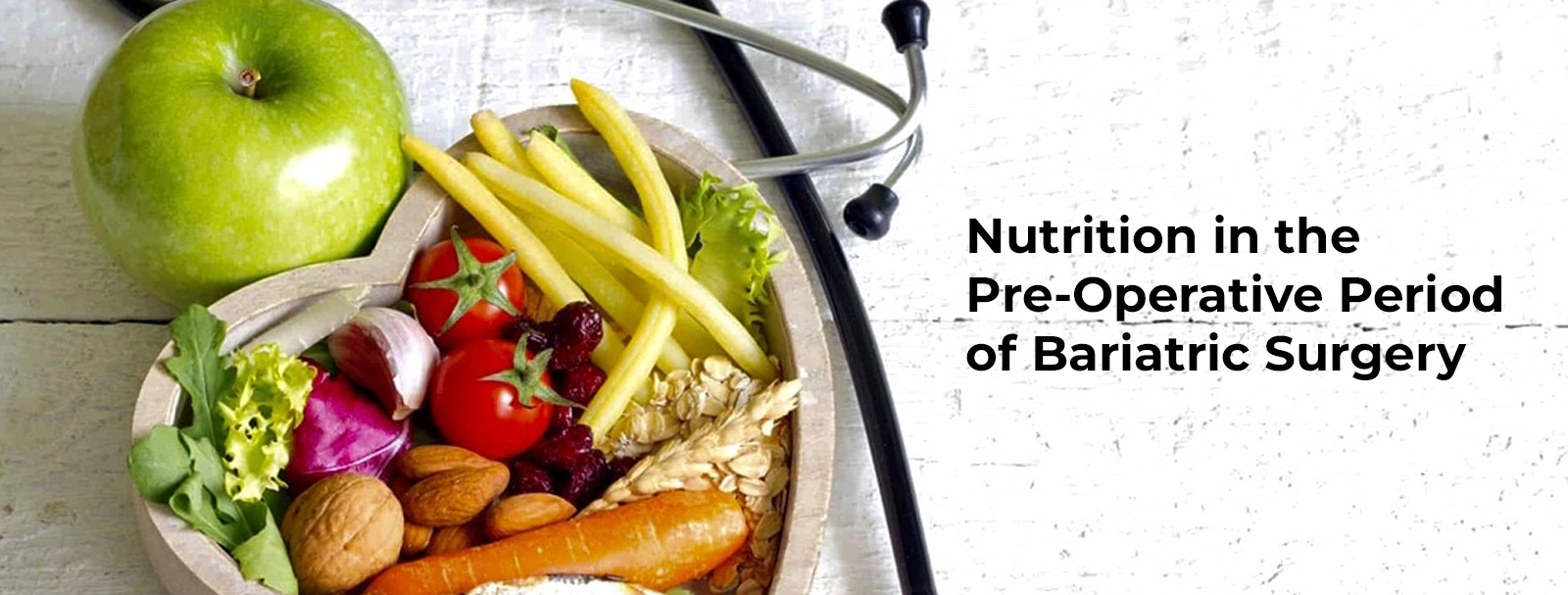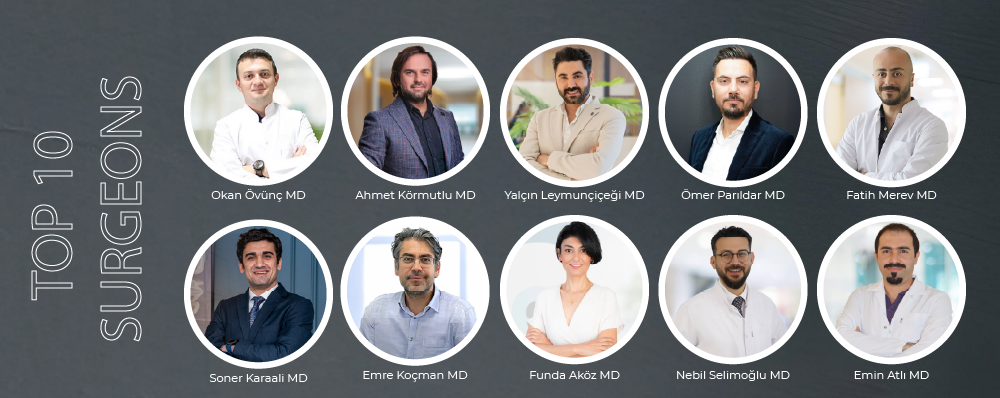Nutrition in the Pre-Operative Period of Bariatric Surgery

Nutrition in the Pre-Operative Period of Bariatric Surgery
The pre-operative diet before bariatric surgery is designed to reduce liver and intra-abdominal fat, preserve muscle tissue by increasing protein intake, prepare the body for surgery and the healing process, and ready the patient for the postoperative diet. Additionally, implementing this diet before surgery will reduce the risk of complications. If a sufficient amount of weight loss is achieved, the surgery can be performed more easily laparoscopically. During this period, a diet program should be tailored to patients' needs, providing low-energy, low-carbohydrate, and sufficient protein intake. It is recommended to follow this diet program for at least two weeks before surgery. The pre-operative diet should be balanced in terms of food groups to minimize the risk of vitamin and mineral deficiencies. Sufficient fiber and water intake are also recommended during this period to prevent constipation or diarrhea.
In the pre-operative period, avoiding alcohol is advised due to the potential for exceeding calorie intake and increasing the risk of complications during surgery. However, there is no restriction on the consumption of herbal teas, black tea, or coffee. Patients who wish to do so can start using protein shakes during this period.
A sample day of a pre-operative diet before obesity surgery could look like this:
09:00 Breakfast: 2 boiled eggs + Fresh vegetables (with a little olive oil) + 1 slice of whole wheat bread
11:00 Snack: 1 apple and 1 tablespoon of unsweetened peanut butter
13:00 Lunch: 1 bowl of homemade soup + Fresh vegetables (with a little olive oil)
15:00 Snack: 4 tablespoons of yogurt with boiled vegetables
17:00 Dinner: 120 grams of grilled chicken breast + 6 tablespoons of boiled quinoa
19:00 Snack: 2 dried apricots and 1 cup of kefir
(Note: The quantities provided in the list are just examples and may vary based on individual needs.)
Post- Operation Nutrition
The post-bariatric surgery nutrition process is gradual. While it may seem complex for some, working with specialized dietitians can make this process much easier. The primary goal in the early stages of post-bariatric surgery nutrition is to heal postoperative tissue damage in a healthy manner. Subsequently, the key objectives are minimizing the loss of lean tissue to enhance fat loss, adjusting the diet to provide early satiety without causing reflux or dumping syndrome, facilitating weight loss, and preventing weight regain. Healthy post-bariatric surgery nutrition, combined with regular physical activity and adequate fluid intake, is crucial to achieving desired goals.
Bariatric Surgery Post-Operative Nutrition: Stage 1 - Liquid Diet
Beginning normal eating immediately after bariatric surgery can lead to various health problems, including damage to stitches. Therefore, progressing through stages is more beneficial. Starting from the first day after surgery, a liquid diet is implemented for the first 2 weeks. It is strongly advised not to consume any solid food before these initial 2 weeks for your own health. In the initial days, the focus is mainly on liquid intake without any solid components. This diet is followed during the hospital stay, aiming to check for any leaks in the gastrointestinal system and prepare the body for fluid intake. Two to three days after surgery, along with these liquids, the intake of protein shakes, which are the primary protein source for the first month, is also initiated. Gradually, more viscous liquids are introduced, but it is crucial that these liquids are free of solid particles.
The following are examples of liquids that can be consumed during this initial 2-week liquid period:
· Water
· Protein shakes
· Lactose-free milk
· Plant-based milks
· Clear bone broths
· Herbal teas
· Clear soups (preferably homemade and free of gas-producing vegetables)
· 100% fruit juices (mixed with water to prevent dumping syndrome, and not to exceed 100 ml per day) (Juices of acidic fruits such as mandarin, orange, lemon are preferable after 2 months of surgery)
· Decaffeinated coffee and decaffeinated black tea (Can be started 10 days after surgery, and decaffeinated consumption is recommended for 2 months due to the risk of dehydration after surgery) - Tea, coffee, and caffeinated beverages should be limited as they can lead to dehydration; no more than 3 cups of tea and/or coffee should be consumed in a day.
Particularly, the consumption of protein shakes is essential starting from the liquid phase, especially in the first month. This is because, during the initial month, there is insufficient stomach capacity, and protein beverages will be the main source of protein. Consuming at least 50 grams of protein daily from protein shakes is crucial for preventing healthy tissue loss and promoting recovery.
During the first 2 weeks of the liquid diet after bariatric surgery, it is important to sip liquids continuously throughout the day. Consuming large amounts of liquids suddenly can harm stitches and lead to problems such as burning sensations, cramps, nausea, and diarrhea in the stomach and throat. As time passes, sips can be larger, and multiple sips can be taken at once. However, especially in the early stages of the liquid nutrition period, since large amounts of liquids cannot be consumed in one go, it is advisable to continuously consume liquids without adhering to meal times. During the liquid nutrition period, a daily intake of up to 2 liters of fluids (including water) is recommended. Achieving this target may not be possible in the initial days, and you should not blame yourself. As time goes on and your tolerance improves, your fluid intake will also improve.
Since dietary fiber intake is very limited during the liquid period, problems such as constipation or diarrhea may occur more frequently. You can consult your dietitian about what to do during this period.
Bariatric Surgery Post-Operative Nutrition: Stage 2 - Pureed Diet
After bariatric surgery, the transition to a pureed diet should begin at the end of the second week. The pureed diet will continue for two weeks. During this period, meals to be tried should have a consistency similar to baby food. Consumption of solid foods is not recommended during this stage. Soft, protein-rich, and nutrient-dense foods, preferably pureed, are preferred. Initially, simpler recipes should be tried rather than complex ones. Portion sizes are generally kept small due to the reduced stomach capacity. Although a precise amount is not specified, consuming about 3-4 tablespoons of food initially can help individuals feel satisfied. Since a small amount of food is satiating, hunger may be felt again 2-4 hours after eating. This is normal, so it is recommended not to keep oneself hungry for extended periods from the pureed stage onwards. Otherwise, individuals may experience overeating attacks, leading to various health problems. Similar to the liquid stage, nutrient intake can gradually increase during the pureed stage as recovery and tolerance improve, which is normal.
In the pureed stage, it is essential to focus on a protein-heavy diet for recovery and adequate protein intake. To support protein intake, the consumption of protein shakes should continue during the pureed stage. Like the liquid stage, a daily intake of at least 50 grams of protein from protein shakes is recommended. During this period, protein powders can be mixed with yogurts, smoothies, and oatmeal, especially for those who have grown tired of just consuming protein shakes.
Some foods that can be consumed during this period include:
· Ground chicken, ground beef, ground turkey (lean)
· Soft fish (e.g., salmon, trout) - should be consumed by mashing with a fork
· Cottage cheese
· Tofu
· Eggs (thoroughly cooked and pureed)
· Soft, mashed cheeses, cottage cheese
· Cream cheeses (preferably low-fat)
· Pureed oats
· Cooked and pureed vegetables (non-gassy ones)
· Pureed fruits (acidic fruits like mandarin, orange, lemon are preferable after 2 months of surgery)
· Avocado (pureed)
· Unsweetened peanut and almond butters
· Yogurt (without added sugar)
During the pureed stage, the consumption of carbohydrates such as rice, bread, and pasta should be avoided. Ensure an adequate intake of protein, fruits, and vegetables, and later these carbohydrate-rich foods can be reintroduced.
Starting from this stage, it is recommended to cook vegetables before consumption, especially in the first 2 months after surgery. This is primarily to remove gas and acidity from cooked vegetables but also to ensure a kind of sanitation. Harmful microorganisms on raw vegetables can pose an infection risk.
From the pureed stage onwards, adherence to the rule of separating liquid and solid intake is crucial for patients' health and to prevent Dumping Syndrome. Under this rule, individuals must strictly avoid any liquid intake (even water) 30 minutes before and after meals.
An example nutrition program for the pureed stage could be as follows:
9:00 Breakfast: Protein Shake
11:00 Snack: Mashed banana
13:00 Lunch: Scrambled eggs made with 1 egg and low-fat cheese
15:00 Snack: Protein Shake
17:00 Dinner: Cooked ground chicken
19:00 Snack: 2 tablespoons of yogurt
(Note: The quantities provided in the list are just examples and may vary based on individual needs.)
Bariatric Surgery Post-Operative Nutrition: Stage 3 - Transition to Solid Food, Normal Eating
One month after bariatric surgery, a gradual transition to solid food can begin. Energy and macronutrient needs are determined based on height, body weight, and age. Protein intake is particularly crucial. It is recommended to start trying new foods slowly, paying careful attention to the tolerance of thicker textures. Solid and liquid foods should not be consumed together. To avoid symptoms that may arise from the consumption of liquids and solids (such as dumping syndrome), liquids should not be taken with meals, and they should be consumed 30 minutes before and/or after meals. The use of small plates for portion control is also recommended at this stage.
At this stage, a balanced and adequate healthy eating diet is adopted, encompassing all food groups, and is planned to continue throughout life. Postoperative diet counseling is crucial in preventing protein deficiency and subsequent muscle mass loss. Protein requirements are generally recommended at 60-90 g/day or 1-1.5 g/kg (ideal body weight). The recommended maximum protein amount is 2.1 g/ideal body weight. Carbohydrates are essential for the healthy functioning of the nervous system and other bodily functions; therefore, reintroducing carbohydrates into the solid diet should be done gradually. Concentrated sugars should be excluded from the diet to prevent dumping syndrome and reduce energy intake. Similarly, avoiding high-calorie fast food and fried foods is recommended.
When sufficient protein, fruit, and vegetable intake is confirmed, healthy carbohydrate sources such as whole wheat, rye, oat flours, and bran cereals can be introduced. Healthy carbohydrate choices, rich in fiber, should be preferred. These carbohydrates help regulate blood sugar, prevent sudden cravings, and, due to their high fiber content, promote a feeling of satiety with smaller quantities, making it easier to create a daily calorie deficit for weight loss.
In terms of preparing meals during this period, using a plate model can be helpful. Placing half of a small to medium-sized plate (50%) as a protein source, 30% as vegetables, and the remaining 20% with healthy carbohydrate sources is a good approach. The order of eating should prioritize proteins first, followed by vegetables, and finally, healthy carbohydrates. When individuals feel satiated, even if there is food left on their plate, they should stop eating. Eating can be resumed when hunger is felt again 2-3 hours later.
An example nutrition program for the solid food stage could be as follows:
9:00 Breakfast: Overnight oats with mixed fruits
11:00 Snack: Protein shake (If the protein target cannot be achieved with regular foods, the consumption of protein shakes may need to continue for a while.)
13:00 Lunch: 2 grilled meatballs made from lean ground beef and boiled vegetables (When protein intake is sufficient, healthy carbohydrate sources like whole wheat pasta or quinoa can be added according to the healthy plate model.)
15:00 Snack – 1 serving of fresh, seasonal fruit
17:00 Dinner – ½ portion of grilled fish and boiled vegetables (When protein intake is sufficient, healthy carbohydrate sources like whole wheat pasta or quinoa can be added according to the healthy plate model.)
19:00 – 1 cup of semi-skimmed/skimmed milk
(Note: The quantities provided in the list are just examples and may vary based on individual needs.)
Nausea and vomiting are often observed in patients attempting to overeat, not chewing sufficiently, and swallowing large amounts of food. Frequent vomiting and reduced food intake can result in dehydration. Therefore, it is recommended for patients to eat small, chew thoroughly, and consume small bites, avoiding excessive fluid intake at once. It is advised to sip water continuously throughout the day rather than consuming large amounts of liquid in one go and not waiting to become thirsty to drink water. In cases of constipation and diarrhea, the dietary fiber content may be reconsidered. Food intolerance can be particularly observed in dry, chewy, fibrous foods, red meats like beef, and raw vegetables. Patients are advised to add new foods to their diets each time and avoid consuming foods they cannot tolerate during this process. Since excessively sugary and fatty foods can trigger Dumping Syndrome, patients are advised not to include or limit such foods in their diets.
Meal quantity varies from person to person due to each individual's unique metabolism, and it's entirely normal. In this situation, try not to compare yourself to others and focus on your own journey. Just like in other stages, remember that the portions you can consume may increase over time in this stage, and this is completely normal.
During the normal eating stage, individuals can keep a daily food record. By sharing this data with a dietitian, the average protein intake can be determined, and in necessary cases, the consumption of protein shakes may continue for a while.
After obesity surgery, the consumption of carbonated (fizzy) beverages is not recommended. Studies have shown that these beverages may increase stomach capacity again, reducing the effectiveness of the surgery. Especially in the first 6 months, alcohol consumption should be avoided. Consuming alcohol before 6 months may lead to infections in stitches and can also cause dumping syndrome.
The most common reason for weight gain after surgery is often consuming calories. After a certain period, individuals may not feel restricted in fluid intake, leading to excessive consumption of high-calorie beverages (such as carbonated drinks and alcohol). Therefore, avoiding these drinks is important, and if not entirely avoided, their consumption should be restricted. It should be remembered that obesity surgery is not a definitive solution. Obesity surgery is a tool that can assist in achieving weight loss goals, and it is important to support this tool with healthy lifestyle behaviors
Ensuring an adequate intake of fluids and proper hydration is crucial for both the healthy functioning of the body and preventing sudden food cravings during the weight loss process. Insufficient fluid intake may lead to more frequent "grazing," a continuous need for snacking. Using reusable water bottles, flavoring water with ingredients like lemon slices, orange slices, or cinnamon, and setting alarms on your phone can help you achieve sufficient water intake. It is suggested that a daily intake of 2 liters of water is healthy, and you can aim for this number. However, reaching this goal may be challenging, especially in the early stages of solid food intake, so give yourself time.
Adequate and regular physical activity is another essential tool that will assist you on this journey. Engaging in sufficient and regular physical activity will contribute to a healthy weight loss by supporting you in preserving muscle mass, allowing you to lose more weight from your fat mass. The World Health Organization recommends, in addition to 150 to 300 minutes of moderate-intensity or 75 to 150 minutes of vigorous-intensity physical activity per week, performing muscle-strengthening exercises twice a week for adult individuals. The process of physical activity should initially be short-term and gradually increased over time. Choosing a physical activity that you enjoy will make it easier for you to incorporate exercise into your daily life. Patients who have undergone obesity surgery may prefer mild to moderate physical activities in the first 3 months; if they wish to engage in weight training, they should not exceed 5 kilograms in the first 3 months. After the third month, they can include more intense physical activities and use weights greater than 5 kilograms.
Although bariatric surgery positively affects overall health, it also brings the risks of serious nutritional deficiencies. Complications such as insufficient energy intake, rapid weight loss, food intolerance, lack of nutritional support, or prolonged vomiting complaints that may occur after surgery can lead to nutritional deficiencies. Multivitamins designed for adults and containing calcium, vitamin D, iron, B vitamins, folic acid, zinc, copper, vitamin C, biotin, and thiamine should be consumed alongside a liquid diet immediately after surgery. If essential minerals and vitamins are not present in the chosen multivitamin, the deficient mineral/vitamin can be taken separately. Since solid consumption is not recommended in the first month after surgery, it is advisable to prefer liquid forms such as sprays or syrups for multivitamins.





